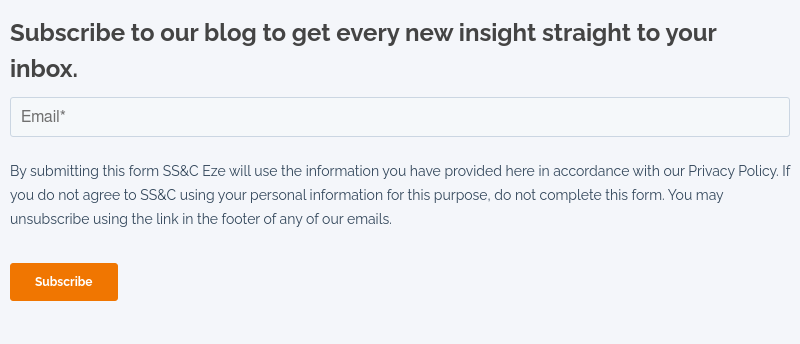A recent survey by Hedgeweek reports that hedge fund outsourcing has yet to reach its peak as firms continue accelerating their adoption of outsourced solutions. According to the survey, around 70 percent of funds outsource a “meaningful proportion” of their middle office, around 80 percent do so for their back office, and over a third outsource a “meaningful proportion” of their front office.
However, successful outsourcing requires funds to be strategic about what functions to outsource, which partners to work with, and when to consider bringing operations back in-house.
To better understand the complexities of outsourcing, we interviewed hedge fund Chief Operating Officer/Chief Financial Officer Brian Tsai. With over 18 years of experience as a COO/CFO, Brian has keen insight into how outsourcing can help hedge funds improve operations and prepare for what lies ahead.

The Evolution of Hedge Fund Outsourcing
While outsourcing has gotten more attention in recent years, Brian says that hedge fund outsourcing is not new. One of the earliest roles to be outsourced was trading.
Then, in 2008, investors were looking for a way to keep funds more accountable and ensure they weren’t "cooking the books." Brian recalls, "To meet investor demands, hedge funds hired independent, outside fund administrators to manage their accounting work."
The pandemic also significantly impacted the industry's view of outsourcing, demonstrating for hedge funds and allocators the decisive role outsourcing could play in running a fund amidst pandemic-related challenges and beyond.
"Since the pandemic, outsourcing has moved to the mainstream. Today, hedge funds can outsource virtually everything. They just need to be strategic about what they outsource and to whom.”
Moving forward, Brian believes that market and industry pressures will continue to drive the need for hedge fund outsourcing and that "As funds face evolving market headwinds, outsourcing will become even more important.”
“Today, hedge funds can outsource virtually everything. They just need to be strategic about what they outsource and to whom.”
- BRIAN TSAI, CHIEF OPERATING OFFICER/CHIEF FINANCIAL OFFICER
How Firms are Leveraging Outsourced Hedge Fund Operations
Brian shares that today, some of the key ways hedge funds use outsourcing to improve their operations are by reducing key-person risk and increasing the adoption of industry best practices.
"Personnel changes are a constant factor for hedge funds; employees take time off or find other jobs," says Brian. "In these times of change, simple yet critical details like passwords or how to log in to the portal get lost in the transition."
Brian says that using an outsourced provider can better prepare hedge funds for these changes by offloading some of those operational tasks and ensuring continuity in their operations.
"Outsourcing provides a backstop that helps funds be better prepared to navigate these inevitable transitions and ensure that business is not subject to costly interruptions."
In addition to redundancy benefits, Brian believes outsourcing gives hedge funds a better perspective of their business and what lies ahead in this ever-changing industry.
"If a hedge fund has two accountants on staff, the firm’s perspective is limited to those two professionals," says Brian. "By outsourcing, I can tap into the experience of professionals who work with many clients throughout the industry. These outsourced professionals bring the value of that broader perspective to the work they do for your hedge fund, helping you prepare for potential pitfalls.”
Brian shares an example of working with a fund administrator, "Fund administrators work with a range of hedge funds, so they can share best practices," notes Brian. "The administrators provide me with a much better understanding of the various methods and approaches I can take to strengthen my hedge fund operations."
To Outsource or Hire In-House: When and What to Outsource
Brian believes that a fund’s decision to outsource often depends on what stage of its lifecycle the firm is in. Is it a new fund that is about to launch? Or is it a more established fund that has grown its AUM? How a fund answers that question will shape its outsourcing.
For example, Brian notes that new hedge funds just starting out might be concerned about costs, and hiring internal headcount adds up fast. He recommends that these startup hedge funds think about outsourcing more expensive positions.
"Hiring can be a huge expense for a hedge fund," says Brian. "Not only do these positions like a trader or CFO come with salary and benefits, but they likely also require a sizable bonus. Outsourcing makes good sense for hedge funds that don't want to spend that kind of money at launch."
Just starting out? Read what you need to successfully start a hedge fund.
As a hedge fund matures and becomes more established, its outsourcing needs will change.
"Let's say your hedge fund has been around for five years now and has grown its AUM," posits Brian. "At this point, having an outsourced CFO might be a red flag for investors, who prefer to see boots on the ground and management inside established hedge funds rather than outsourced."
As the firm grows further and becomes a developed fund managing multiple billions of dollars, it will rely on a mix of outsourced and in-house support.
Hedge funds should also be strategic about what they outsource.
Hedgeweek's research shows that hedge fund managers are more willing to outsource technology, operations, and regulatory functions to third-party service providers. Outsourcing these functions saves on costs and enables internal teams to focus their expertise on adding value for clients and differentiating the firm from the competition.
Brian agrees, saying, “Paying a CFO to ‘click away,’ reconciling cash dividends, interest accruals, etc., is not an optimal use of money and resources. Outsourcing this operational work to a team like SS&C’s Eze Managed Services frees up the CFO’s time for more strategic work that can advance the firm’s goals.”
What to Look for in an Outsourced Provider
Brian acknowledges that hedge funds need to choose an outsourcing provider carefully. He recommends that funds work with vendors who not only have the primary job skill set but also grasp the specifics of your hedge fund operation.
"Experience is the first and one of the most important qualities to look for in an outsourced provider," stresses Brian. "It is expected that outsourcing providers can perform their tasks, but they should also understand how that work plays into the broader context of your hedge fund."
When speaking with a potential outsourced provider, Brian recommends finding out what team you will be assigned to and asking about their relevant experience. "You don't want the team assigned to your fund spending more time learning on the job than being productive on your account," he says.
He continues, "For example, your provider might look at a set of numbers, think all the numbers line up, the reports line up, etc. But if the provider doesn’t have the contextual understanding, the final product is still wrong."
Brian notes that the stakes get even higher when you hire an outsourced leadership role like a CFO.
When interviewing someone for a leadership position, Brian recommends drilling down to learn if the person has experience in the specific role for which you are hiring them. "Someone with only a 10-year corporate job may not be prepared for a hedge fund leadership position, " Brian emphasizes. "You want someone who has been in the seat and has the hedge fund experience and acumen needed to lead."
Preparing for Turbulence: How Outsourcing Helps Hedge Funds Prepare for What’s Next
In addition to his experience as a CFO, Brian is a trained pilot, a role which has underscored the importance of preparation for him.
"As a pilot, I've experienced engine failures, crash landings, and stalls," says Brian. "But because I had practiced these 'fire drill moments,' I was prepared for those situations.
He carries this approach into his financial leadership. “Being prepared, with both knowledge and the right resources, helps me excel in my work as a hedge fund CFO."
Similarly, Brian believes the right outsourcing support – leveraged strategically at the right time and place for the firm – can bolster hedge funds’ operations and prepare them to weather any market turbulence.


